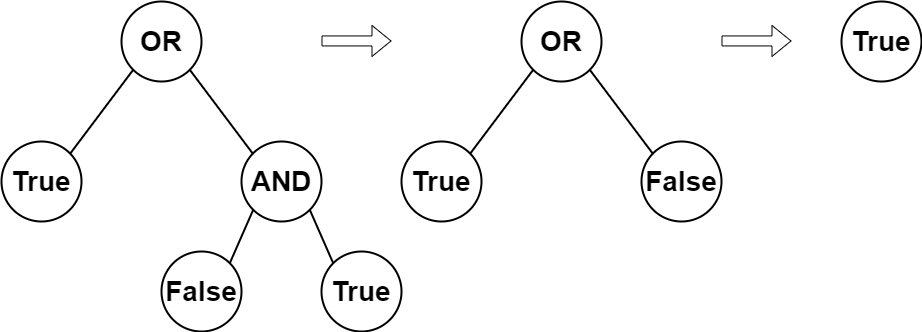| comments | difficulty | edit_url | rating | source | tags | |||
|---|---|---|---|---|---|---|---|---|
true |
Easy |
1303 |
Biweekly Contest 82 Q1 |
|
You are given the root of a full binary tree with the following properties:
- Leaf nodes have either the value
0or1, where0representsFalseand1representsTrue. - Non-leaf nodes have either the value
2or3, where2represents the booleanORand3represents the booleanAND.
The evaluation of a node is as follows:
- If the node is a leaf node, the evaluation is the value of the node, i.e.
TrueorFalse. - Otherwise, evaluate the node's two children and apply the boolean operation of its value with the children's evaluations.
Return the boolean result of evaluating the root node.
A full binary tree is a binary tree where each node has either 0 or 2 children.
A leaf node is a node that has zero children.
Example 1:
Input: root = [2,1,3,null,null,0,1] Output: true Explanation: The above diagram illustrates the evaluation process. The AND node evaluates to False AND True = False. The OR node evaluates to True OR False = True. The root node evaluates to True, so we return true.
Example 2:
Input: root = [0] Output: false Explanation: The root node is a leaf node and it evaluates to false, so we return false.
Constraints:
- The number of nodes in the tree is in the range
[1, 1000]. 0 <= Node.val <= 3- Every node has either
0or2children. - Leaf nodes have a value of
0or1. - Non-leaf nodes have a value of
2or3.
We can use recursion to solve this problem.
For the current node
- If its left child is null, it means the current node is a leaf node. If the value of the current node is
$1$ , then return$\textit{true}$ ; otherwise, return$\textit{false}$ ; - If the value of the current node is
$2$ , then return the logical OR of the recursion results of its left and right children; otherwise, return the logical AND of the recursion results of its left and right children.
The time complexity is
# Definition for a binary tree node.
# class TreeNode:
# def __init__(self, val=0, left=None, right=None):
# self.val = val
# self.left = left
# self.right = right
class Solution:
def evaluateTree(self, root: Optional[TreeNode]) -> bool:
if root.left is None:
return bool(root.val)
op = or_ if root.val == 2 else and_
return op(self.evaluateTree(root.left), self.evaluateTree(root.right))/**
* Definition for a binary tree node.
* public class TreeNode {
* int val;
* TreeNode left;
* TreeNode right;
* TreeNode() {}
* TreeNode(int val) { this.val = val; }
* TreeNode(int val, TreeNode left, TreeNode right) {
* this.val = val;
* this.left = left;
* this.right = right;
* }
* }
*/
class Solution {
public boolean evaluateTree(TreeNode root) {
if (root.left == null) {
return root.val == 1;
}
if (root.val == 2) {
return evaluateTree(root.left) || evaluateTree(root.right);
}
return evaluateTree(root.left) && evaluateTree(root.right);
}
}/**
* Definition for a binary tree node.
* struct TreeNode {
* int val;
* TreeNode *left;
* TreeNode *right;
* TreeNode() : val(0), left(nullptr), right(nullptr) {}
* TreeNode(int x) : val(x), left(nullptr), right(nullptr) {}
* TreeNode(int x, TreeNode *left, TreeNode *right) : val(x), left(left), right(right) {}
* };
*/
class Solution {
public:
bool evaluateTree(TreeNode* root) {
if (!root->left) {
return root->val;
}
if (root->val == 2) {
return evaluateTree(root->left) || evaluateTree(root->right);
}
return evaluateTree(root->left) && evaluateTree(root->right);
}
};/**
* Definition for a binary tree node.
* type TreeNode struct {
* Val int
* Left *TreeNode
* Right *TreeNode
* }
*/
func evaluateTree(root *TreeNode) bool {
if root.Left == nil {
return root.Val == 1
}
if root.Val == 2 {
return evaluateTree(root.Left) || evaluateTree(root.Right)
} else {
return evaluateTree(root.Left) && evaluateTree(root.Right)
}
}/**
* Definition for a binary tree node.
* class TreeNode {
* val: number
* left: TreeNode | null
* right: TreeNode | null
* constructor(val?: number, left?: TreeNode | null, right?: TreeNode | null) {
* this.val = (val===undefined ? 0 : val)
* this.left = (left===undefined ? null : left)
* this.right = (right===undefined ? null : right)
* }
* }
*/
function evaluateTree(root: TreeNode | null): boolean {
const { val, left, right } = root;
if (left === null) {
return val === 1;
}
if (val === 2) {
return evaluateTree(left) || evaluateTree(right);
}
return evaluateTree(left) && evaluateTree(right);
}// Definition for a binary tree node.
// #[derive(Debug, PartialEq, Eq)]
// pub struct TreeNode {
// pub val: i32,
// pub left: Option<Rc<RefCell<TreeNode>>>,
// pub right: Option<Rc<RefCell<TreeNode>>>,
// }
//
// impl TreeNode {
// #[inline]
// pub fn new(val: i32) -> Self {
// TreeNode {
// val,
// left: None,
// right: None
// }
// }
// }
use std::cell::RefCell;
use std::rc::Rc;
impl Solution {
pub fn evaluate_tree(root: Option<Rc<RefCell<TreeNode>>>) -> bool {
match root {
Some(node) => {
let node = node.borrow();
if node.left.is_none() {
return node.val == 1;
}
if node.val == 2 {
return Self::evaluate_tree(node.left.clone())
|| Self::evaluate_tree(node.right.clone());
}
Self::evaluate_tree(node.left.clone()) && Self::evaluate_tree(node.right.clone())
}
None => false,
}
}
}/**
* Definition for a binary tree node.
* struct TreeNode {
* int val;
* struct TreeNode *left;
* struct TreeNode *right;
* };
*/
bool evaluateTree(struct TreeNode* root) {
if (!root->left) {
return root->val == 1;
}
if (root->val == 2) {
return evaluateTree(root->left) || evaluateTree(root->right);
}
return evaluateTree(root->left) && evaluateTree(root->right);
}